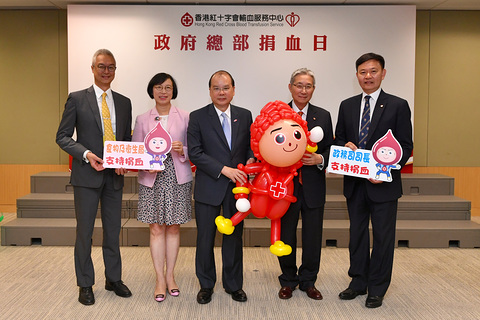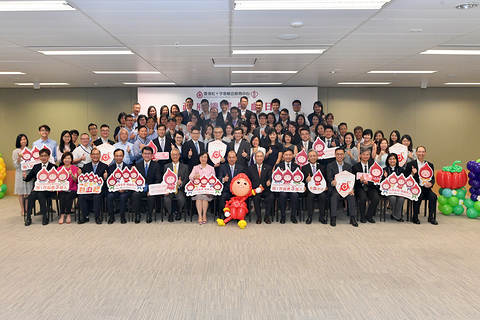Give blood to save lives
29 July 2018
 |
The Hong Kong Red Cross Blood Transfusion Service (BTS) has commenced this year’s mobile blood drive relay at government departments to recruit donors. A two-day blood donation event was held at the Central Government Offices (CGO) two weeks ago. Together with Professor Sophia CHAN, Secretary for Food and Health, and other policy secretaries, I paid it a visit to show the Government’s full support for blood donation.
There is no substitute for blood, and the shelf life of blood is limited. We count on continuous blood donation by the community to keep sufficient blood supply for patients in need of clinical transfusion treatment. A single donation (whole blood) can help three or more patients. Therefore, I appeal to all colleagues to support the call and give blood regularly to save lives. I do hope that, following the expected increase in the civil service establishment by 6 700 posts in 2018-19, our “new blood” will join our league of blood donors.
 |
 |
The CGO blood donation event attracted 278 donors and collected 204 bags of blood, breaking the record of blood donation at the CGO. The importance of the support from various government departments in this regard can hardly be overstated. Over the years, more than 150 government units have arranged for blood collection sessions for their staff. In 2017, 77 mobile blood donation drives were hosted by government departments, adding nearly 4 000 bags of blood to BTS inventories. In the first half of 2018, 55 blood donation events were held by government departments, contributing over 3 000 bags of blood up to mid-July. More will be staged at various government premises in the coming months. Meanwhile, the blood donation drives are also greeted with enthusiasm by colleagues at the Hospital Authority (HA). Nearly 1 000 bags of blood were collected in the first seven months of 2018, on the way to setting a new record this year.
It is worth mentioning that many regular donors are from the disciplinary forces. They are notably disciplined in both their work and blood donation. Mr LI Kam-keung, a retired police officer, is the record holder in blood donation in Hong Kong, giving blood more than 630 times so far. A good number of colleagues from the fire, ambulance and customs services are also active and regular donors. And equally essential is the support of our civilian staff.
Given the increasingly ageing population, Hong Kong’s demand for blood will continue to grow. The BTS is the only local blood collector and supplier for all the hospitals in Hong Kong. According to their information, nearly 160 000 people (159 863) gave blood in 2017 and over 120 000 (126 237) of them were regular donors. About 60% of the blood collected came from donors aged 16 to 40.
As our society develops, the birth rate declines. The number of first-time donors aged 16 to 25 started to drop from over 35 000 in 2011 to only about 20 000 last year. I would like to call upon our young people to join the cause and show what we can do as a caring and compassionate community by giving blood.
Both donor attendances and successful donations dropped in number in 2017 by about 5% as compared with 2016. Besides, nearly 40 000 prospective donors were deferred from giving blood owing to low haemoglobin level in each of the past two years.
To encourage blood donation, the BTS has launched the online appointment service, through which donors can reserve a timeslot at a donor centre according to their preference after completing a simple registration process. A mobile app called “HK Blood” also provides appointment service for donors and convenient access to information about donors’ donation history, locations of donor centres and mobile blood drives, etc. Meanwhile, donors are encouraged to schedule their blood donation before travelling abroad as returned travellers may have to defer blood donation given the potential risk of infectious diseases in a number of tourist destinations.
Giving blood can save lives. We need the collective efforts of different community sectors and organisations to encourage more people to become donors, so as to guarantee timely replenishment of blood inventories to maintain a stable supply for clinical transfusion.
Government departments will continue to fully collaborate with the BTS to host blood donation drives for their staff and open some of their venues for donation sessions for the public. The BTS has also made the service available across the territory through its nine donor centres, two campus donor centres, four mobile donation teams and one mobile blood collection vehicle. Let us pitch in and show our support for blood donation!

